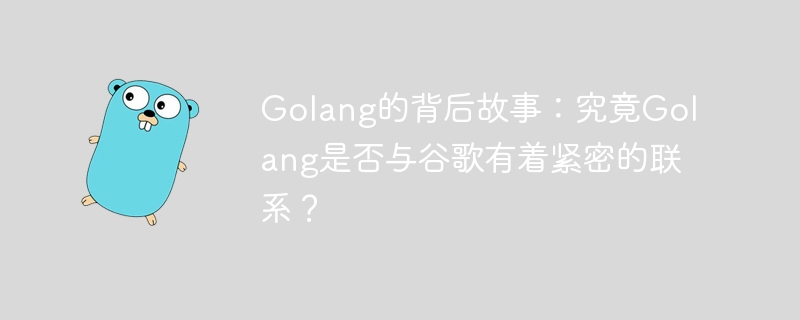

The story behind Golang: Is Golang closely related to Google?
Golang, the Go language, is a programming language developed by Google. It has received widespread attention and use since its public release in 2007. Golang was originally designed to solve some engineering problems and is widely used within Google. However, Golang itself is not a project fully sponsored or directly managed by Google, so the question of whether it is closely related to Google has been discussed. This article will delve into the story behind Golang and unravel the mystery of the relationship between Golang and Google.
Golang was born in 2007 and was designed by three senior engineers: Rob Pike, Ken Thompson and Robert Griesemer. They hoped to develop a programming language that was efficient, simple to use, and easy to maintain to solve some of the engineering problems that existed at the time. Initially, Golang was mainly used to solve some engineering challenges within Google, such as rapid development of efficient back-end services, large-scale concurrent processing, etc. As Golang continues to develop and grow, its application scope within Google has become more and more extensive, and it has gradually become one of the mainstream programming languages within Google.
Although Golang was originally developed within Google, in 2016, Golang's development team decided to open source it so that more developers could participate and jointly promote the development of the language. Golang's open source means that it is no longer limited to Google's internal use, but can be used by developers around the world. This also leads to a common misunderstanding: that Golang is a project fully sponsored or directly managed by Google. In fact, Golang's open source makes it an independent community project, of which Google is only a part of the contributors and supporters and does not fully control its development.
In the following years, Golang quickly won the favor of developers around the world. Its concise syntax, efficient concurrency model, fast compilation speed and other features have become its attractions. More and more companies and developers are beginning to choose Golang as their main development language, which makes the Golang community continue to grow and have more features and tool support.
Although there is no direct ownership relationship between Golang and Google, Google, as the origin and main supporter of Golang, still has an important influence on the development of Golang. Google also uses Golang extensively in some projects, such as Kubernetes, etc., which makes Golang's influence in some fields more significant.
The following is a simple code example to demonstrate some features of Golang:
package main
import "fmt"
func main() {
fmt.Println("Hello, Golang!")
}This code implements a simple function of outputting "Hello, Golang!". As you can see, Golang's syntax is very concise and intuitive, allowing developers to get started quickly and write efficient code. At the same time, Golang's standard library provides a wealth of functional modules to facilitate developers to handle various tasks.
To sum up, Golang, as a programming language developed by Google, was closely related to Google's internal engineering needs in its original design, but it has developed into an independent community project after being open sourced. Golang’s success is due to its strong features and ecosystem, in which Google plays an important role as a supporter and contributor. Through continuous improvement and development, Golang will continue to play an important role in the field of programming, bringing developers a better programming experience and efficiency.
The above is the detailed content of Golang's relationship with Google: Is Golang a product of Google?. For more information, please follow other related articles on the PHP Chinese website!
 Usage of Type keyword in Go
Usage of Type keyword in Go
 How to implement linked list in go
How to implement linked list in go
 What are the Go language programming software?
What are the Go language programming software?
 How to learn go language from 0 basics
How to learn go language from 0 basics
 How to define variables in golang
How to define variables in golang
 What are the methods to implement operator overloading in Go language?
What are the methods to implement operator overloading in Go language?
 What are the operators in Go language?
What are the operators in Go language?
 What are the data conversion methods in golang?
What are the data conversion methods in golang?




